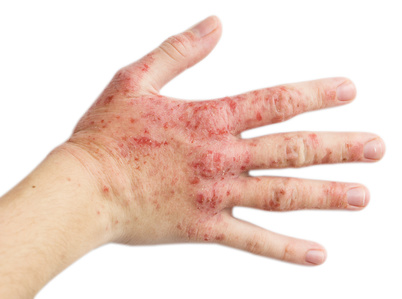Bio-Resonance Therapy for Skin Problems
The skin is the largest organ in our body. Therefore, it is very important for our health for us to correctly diagnose and treat dermatological diseases that are causing symptoms in the skin.
A wide range of conditions can affect the skin from unsightly issues such as acne to potentially life-threatening illnesses such as skin cancer. This article will particularly focus on skin problems that are associated with allergic reactions.
Skin conditions caused by allergic reactions

Eczema affecting the skin of the hand
Skin disease, especially if it affects the face or other visible parts of the body, is an allergic symptom which is often regarded subjectively as particularly unpleasant. The disorder is almost impossible to hide from other people, especially if skin diseases cause redness on the face. Other people may have a fear of possible contagion, leading some sufferers to withdraw from social contact.
Allergically induced rashes, known as contact dermatitis, may be mild and affect only small areas of skin, or they may extend throughout the whole body. Symptoms range in intensity from slight reddening of the skin through to scaly or oozing eczema to ulceration. The symptoms are almost always linked with itching of varying severity. Scratching provides a short-term relief but usually aggravates the rash and can lead to additional infections.
Which allergies are involved?
Various different types of allergies can result in dermatological symptoms. These may include allergies to certain substances that are applied directly to the skin such as those found in cosmetic products. Other allergies that may be involved include sensitivities to dust mites, certain foods, additives, pollen or particular chemicals that are used in household cleaning products.
In some cases, a very severe allergic reaction may become a medical emergency. This could be the case if swelling is making breathing difficult or if an infection has become out of control, perhaps due to a weakened immune system.
What are the possible causes of allergies?
While the precise reason for a person developing an allergic reaction in the skin may not be known, there are various factors that might be involved. For example, those with a family history of allergic conditions are more likely to develop allergies themselves. A lack of balance in the intestinal flora can negatively impact the body’s defences and an underlying fungal infection can put a strain on the immune system. There also may be a negative reaction caused by metal contamination or an intolerance to certain substances found in vaccines.
How are skin conditions treated?
Common skin treatments
In conventional medicine a distinction is made between acute or chronic skin eruptions and eczema neuronal dermatitis and some other clinical pictures. Treatment is usually topical without looking into the root cause that may have led the patient to develop allergies. After making a diagnosis, a doctor may prescribe specialised creams and moisturisers as a first line defence against common skin conditions.
Cortisone ointment certainly helps in the case of conditions such as eczema (atopic dermatitis) and psoriasis by helping to sooth flare ups of sore, itchy skin and reduce swelling. That said, this treatment only benefits the patient while it is applied and is not able to provide lasting relief or cure the illness.
Targeting common allergens
Numerous alternative therapists with many years of experience in this area have found that chronic food allergies to cow’s milk, or wheat, usually coupled with intestinal mycosis, plays a crucial role in neurodermatitis and chronic eczema. Obviously, taking steps to avoid these problematic allergens through diet and lifestyle changes will make it less likely that a severe reaction will occur.
However, when a person is suffering from a chronic skin condition, this may place excessive restrictions on their everyday activities. This has led many people to turn to alternative treatments to enhance their skin health and boost the immune system. Many of these cases of chronic allergies have been treated successfully using BICOM® bioresonance therapy.
Treating skin problems with bioresonance
A BICOM® bioresonance therapist will look at what is stressing your body from the inside rather than simply treating the symptoms. If the body is not eliminating toxins effectively, they can come out of the skin which is an elimination organ. A typical bioresonance session will include basic therapy, liver, lymph and kidney programs to help remove toxins from the body.
It is important to remove stress such as parasites, fungal infection, candida, allergens and other irritants. By removing these stressors, the body will be under less stress and often skin conditions become much improved as a result.
For a blood test using the BICOM® please visit here

